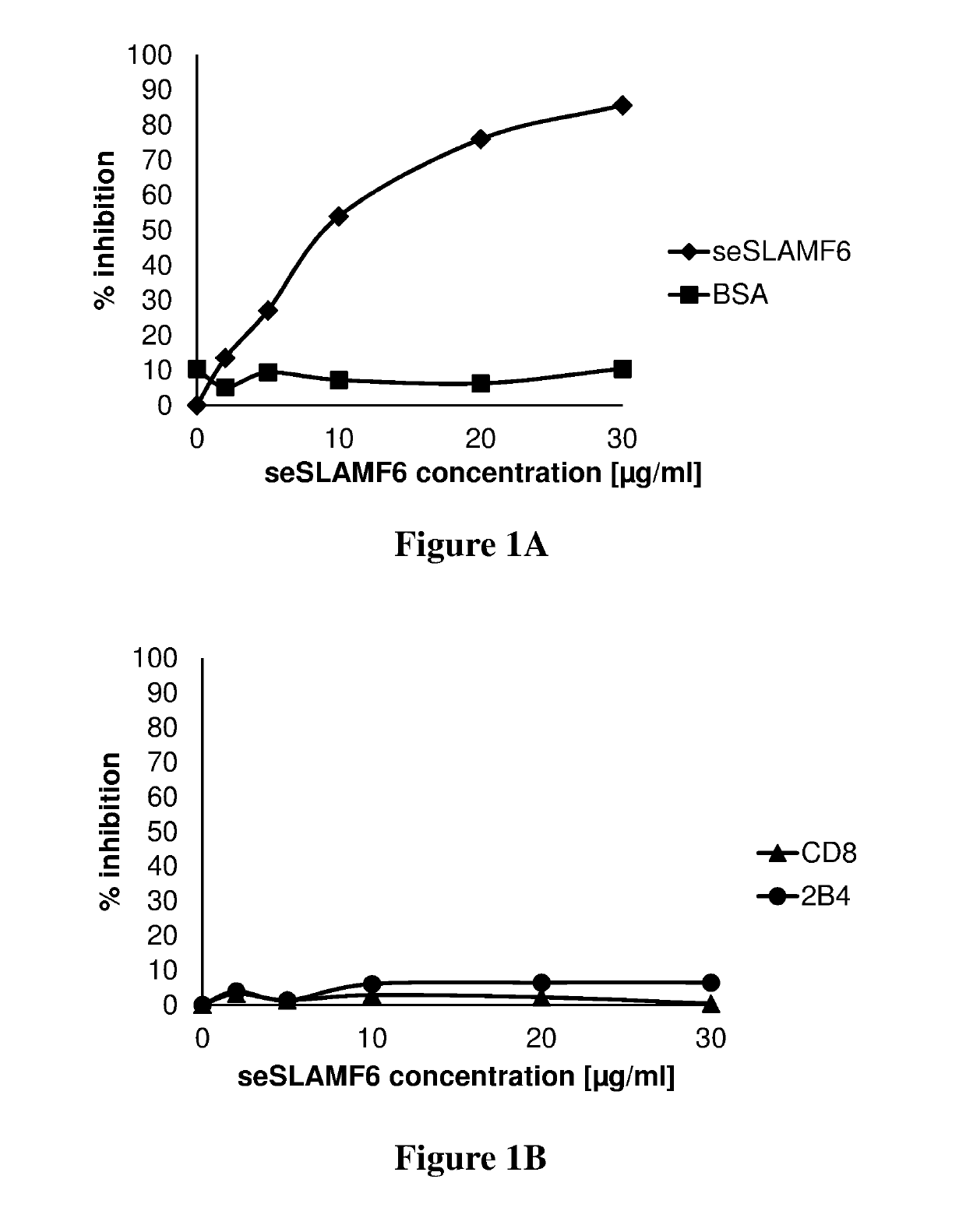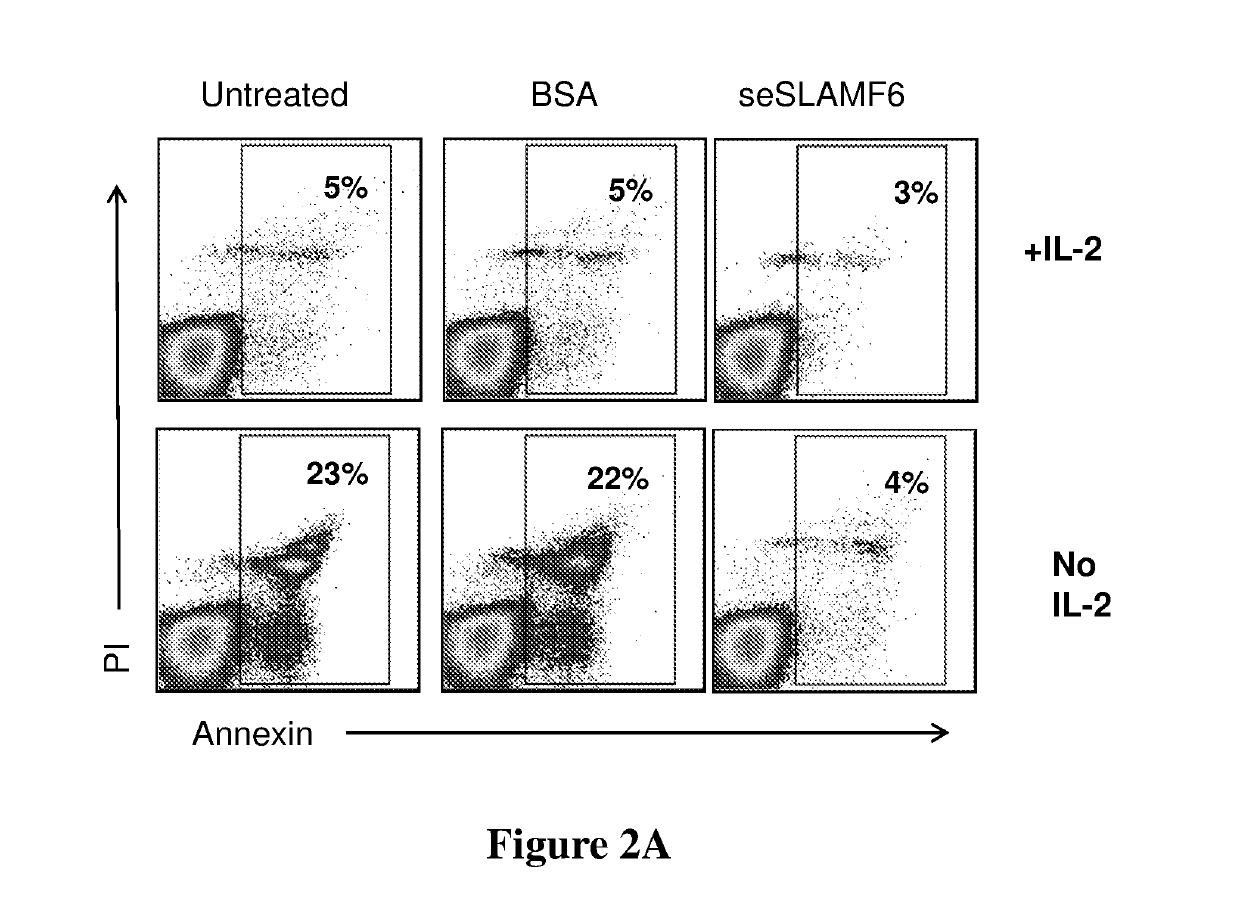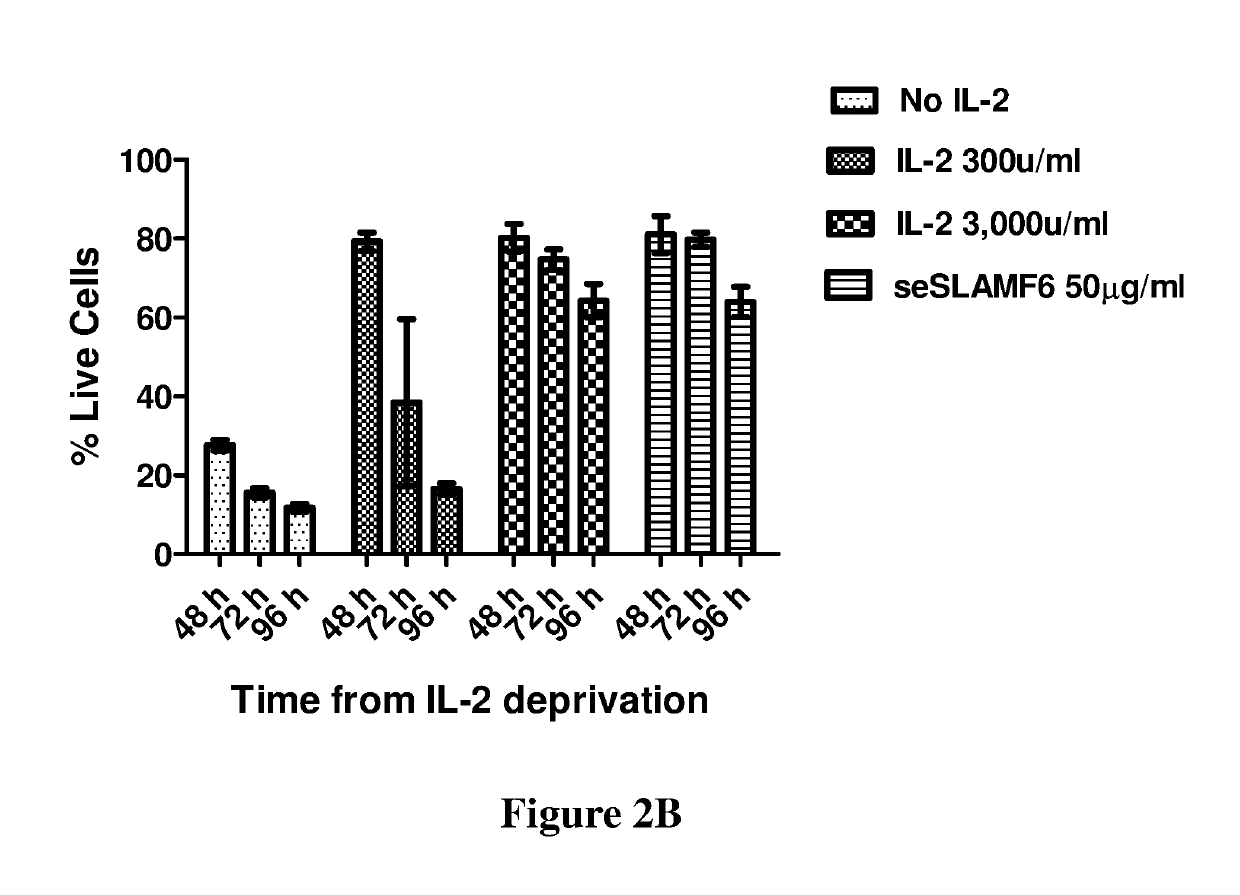Cell compositions and methods for cancer therapy
a cell composition and cancer technology, applied in the field of immunotherapy, can solve the problems of affecting the treatment effect, and unable to maintain activated t cells, so as to improve the modulation of t cells, prevent and treat cytopenia in susceptible patients, and enhance the anti-tumor effect.
- Summary
- Abstract
- Description
- Claims
- Application Information
AI Technical Summary
Benefits of technology
Problems solved by technology
Method used
Image
Examples
example 1
-A Ectodomain
[0203]A human NTB-A having an amino acid sequence as set forth below, corresponds to accession no. Q96DU3, as follows;
[0204]
(SEQ ID NO: 1)MLWLFQSLLF VFCFGPGNVV SQSSLTPLMV NGILGESVTLPLEFPAGEKV NFITWLFNET SLAFIVPHET KSPEIHVTNPKQGKRLNFTQ SYSLQLSNLK MEDTGSYRAQ ISTKTSAKLSSYTLRILRQL RNIQVTNHSQ LFQNMTCELH LTCSVEDADDNVSFRWEALG NTLSSQPNLT VSWDPRISSE QDYTCIAENAVSNLSFSVSA QKLCEDVKIQ YTDTKMILFM VSGICIVFGFIILLLLVLRK RRDSLSLSTQ RTQGPAESAR NLEYVSVSPTNNTVYASVTH SNRETEIWTP RENDTITIYS TINHSKESKPTFSRATALDN VV.
[0205]The ectodomain of this protein has been identified to be located at positions 22-226. Thus, an NTB-A ectodomain may have an amino acid sequence corresponding to positions 22-226 in the above human sequence, or to the corresponding positions in an NTB-A sequences known in the art. In other embodiments, the use of variants, homologs and derivatives thereof, which are recognized by a skilled artisan as structural and functional equivalents thereof, is contemplated (for example con...
example 2
Binding of seSLAMF6
[0209]In order to demonstrate binding of seSLAMF6 to its homotypic receptor, human tumor infiltrating lymphocytes (TILs) were incubated with increasing concentrations of seSLAMF6 or with bovine serum albumin (BSA, irrelevant protein control). For these experiments, 200,000 TILs (209) in 100 μl FACS buffer were added to each FACS tube. Various sNTB-A (seSLAMF6) or BSA concentrations, ranging from 0 to 30 μg / ml were added to each tube and incubated at 4° C. for 45 min Samples were washed once, and 10 μl PE-conjugated anti-seSLAMF6 antibody (clone NT-7, Biolegend) or isotype control were added to each tube (FIG. 1A). As an additional negative control, samples were also stained for CD8 and 2B4 receptors (FIG. 1B). After 45 min incubation at 4° C. the cells were washed and analyzed by flow cytometry. As can be seen in FIGS. 1A-B, seSLAMF6 completely inhibited binding of anti-SLAMF6 antibodies to tumor infiltrating lymphocytes (A), and did not inhibit binding of anti-CD...
example 3
gagement by seSLAMF6 Improves Survival of Activated Anti-Melanoma T Cells
[0210]Human TILs (209) were co-cultured with cognate melanoma cells (624mel) for 3 days (at a 1:4 ratio, in complete medium with IL-2 6,000 IU / ml, 37° C., 5% CO2), and then allowed to proliferate in complete medium (CM) containing IL-2 (6000 IU / ml) for 7 days. After proliferation, IL-2 (6000 IU / ml) was further supplemented or withdrawn, and the cells were treated with either seSLAMF6 (SEQ ID NO: 3, 10 μg / ml) or BSA (10 μg / ml; (“control”), or remained untreated. Cells were labeled with propidium-iodide (PI), a marker of cell death, and Annexin-V, a marker of apoptosis, and analyzed by flow cytometry. FIG. 2A shows that the addition of seSLAMF6 reduced the ratio of cell death and apoptosis from 23% to 4%. The effect of seSLAMF6 was identical to that of IL-2, showing that SLAMF6 engagement can replace IL-2 and prevent activation-induced cell death (AICD).
[0211]In a different experiment, human TILs (209), reactive ...
PUM
| Property | Measurement | Unit |
|---|---|---|
| molecular weight | aaaaa | aaaaa |
| concentrations | aaaaa | aaaaa |
| RICD resistance | aaaaa | aaaaa |
Abstract
Description
Claims
Application Information
 Login to View More
Login to View More - R&D
- Intellectual Property
- Life Sciences
- Materials
- Tech Scout
- Unparalleled Data Quality
- Higher Quality Content
- 60% Fewer Hallucinations
Browse by: Latest US Patents, China's latest patents, Technical Efficacy Thesaurus, Application Domain, Technology Topic, Popular Technical Reports.
© 2025 PatSnap. All rights reserved.Legal|Privacy policy|Modern Slavery Act Transparency Statement|Sitemap|About US| Contact US: help@patsnap.com



